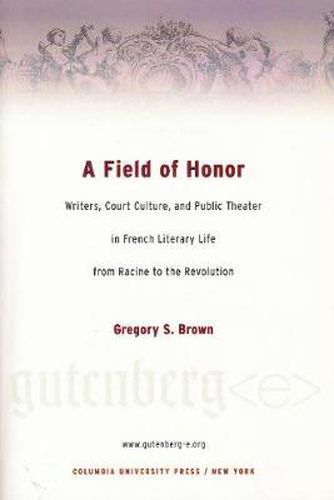Readings Newsletter
Become a Readings Member to make your shopping experience even easier.
Sign in or sign up for free!
You’re not far away from qualifying for FREE standard shipping within Australia
You’ve qualified for FREE standard shipping within Australia
The cart is loading…






Gregory S. Brown’s A Field of Honor: The Identities of Writers, Court Culture and Public Theater in the French Intellectual Field from Racine to the Revolution offers a multilevel study of the intellectual, social, and institutional contexts of dramatic authorship and the world of playwrights in 18th-century Paris. Brown deftly interweaves research in archival and printed materials, case studies of individual authorial strategies, the rich, often contentious historiography on the French Enlightenment and contemporary cultural theory and criticism. Drawing on a sophisticated array of recent studies, Brown positions his work against and between the grain of alternative approaches and interpretations. He combines scholarship on the history of the book with analyses of political culture and cultural identity, leaving the reader with a strong and revealing appreciation for the tensions and crosscurrents staged at the center of the 18th-century republic of letters.
$9.00 standard shipping within Australia
FREE standard shipping within Australia for orders over $100.00
Express & International shipping calculated at checkout
Gregory S. Brown’s A Field of Honor: The Identities of Writers, Court Culture and Public Theater in the French Intellectual Field from Racine to the Revolution offers a multilevel study of the intellectual, social, and institutional contexts of dramatic authorship and the world of playwrights in 18th-century Paris. Brown deftly interweaves research in archival and printed materials, case studies of individual authorial strategies, the rich, often contentious historiography on the French Enlightenment and contemporary cultural theory and criticism. Drawing on a sophisticated array of recent studies, Brown positions his work against and between the grain of alternative approaches and interpretations. He combines scholarship on the history of the book with analyses of political culture and cultural identity, leaving the reader with a strong and revealing appreciation for the tensions and crosscurrents staged at the center of the 18th-century republic of letters.